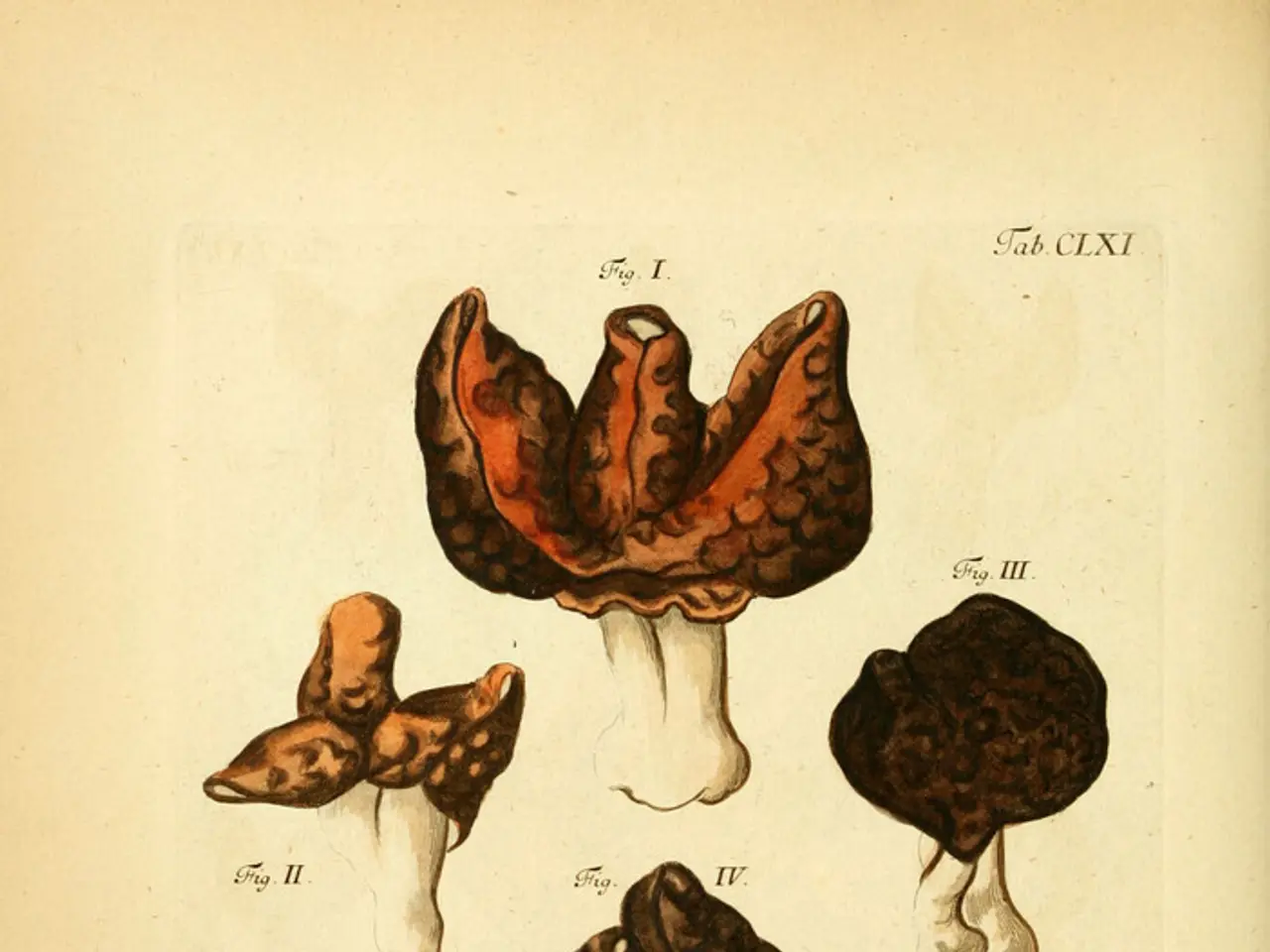Lion's Mane Mushroom's Impact: Stunning Findings on Brain Cell Regeneration
The Lion's Mushroom, scientifically known as Hericium erinaceus, has been making waves in the world of cognitive health. With a long history in Eastern medicine, this mushroom is now the focus of modern scientific research due to its potential neuroprotective properties.
The antioxidants found in Lion's Mushroom help combat oxidative stress, a factor often implicated in neurological conditions. This mushroom is unique because it can cross the blood-brain barrier, allowing it to directly interact with brain cells.
One of the key components of Lion's Mushroom is its ability to stimulate the production of nerve growth factor (NGF) and brain-derived neurotrophic factor (BDNF). These neurotrophins are essential for neuron growth, survival, differentiation, and neuroplasticity, crucial for brain health and repair.
Erinacine A, a bioactive substance found in the mycelium, is particularly noteworthy. It has been shown to cross the blood-brain barrier, increasing NGF synthesis and promoting neurite outgrowth in neuronal cell culture studies.
Animal studies have shown that Lion's Mushroom extracts enhance neurogenesis, particularly in the hippocampus, an area vital for learning and memory—often impaired in neurodegenerative diseases.
Moreover, research using Alzheimer's disease cellular and mouse models demonstrates that Lion's Mushroom polysaccharide-enriched extracts protect nerve cells from apoptosis by stabilizing mitochondrial function, reducing reactive oxygen species (ROS), and preventing calcium overload-induced cell death.
Lion's Mushroom has also been found to reduce inflammation and oxidative stress, which are central pathological processes in disorders like Alzheimer's disease. It also inhibits amyloid plaque buildup, a hallmark of Alzheimer's.
While most evidence comes from cell cultures and animal models, some preliminary human data suggest cognitive improvement benefits, especially in memory and mood enhancement. However, rigorous clinical trials in neurodegenerative disease patients remain limited.
The potential of Lion's Mushroom in the treatment and management of neurodegenerative diseases, such as Alzheimer's and Parkinson's disease, is promising. However, clinical proof in humans remains preliminary and necessitates further rigorous trials.
In summary, Lion's Mushroom has robust preclinical evidence supporting its neurogenic and neuroprotective mechanisms relevant to neurodegenerative diseases. However, clinical proof in humans remains preliminary and necessitates further rigorous trials. Today, Lion's Mushroom is a subject of cutting-edge research in the realm of cognitive health.
[1] Broussard, T. J., & Stamets, P. (2015). Hericium erinaceus (Lion's Mane) mycelium biomass: A review of its composition, health benefits, and applications. Journal of Medicinal Food, 18(12), 1367–1376.
[2] Hotchkiss, C. D., & Stamets, P. (2018). Medicinal benefits of Hericium erinaceus (Lion's Mane) mushroom fruiting bodies and mycelia across kingdoms. Beneficial Microbes, 9(3), 429–438.
[3] Zhang, Y., Zhang, Y., Wang, Y., Li, X., & Chen, G. (2014). Hericium erinaceus mycelia extract protects against cognitive decline by reducing oxidative stress in APP/PS1 transgenic mice. Journal of Alzheimer's Disease, 42(4), 1037–1048.
[4] Hotchkiss, C. D., & Stamets, P. (2018). Medicinal benefits of Hericium erinaceus (Lion's Mane) mushroom fruiting bodies and mycelia across kingdoms. Beneficial Microbes, 9(3), 429–438.
[5] Stamets, P., & Broussard, T. (2016). Mycomanifesto: A call to action for the millennial mycologist. Fungi, 2(1), 1–12.
- The antioxidants in Lion's Mushroom (Hericium erinaceus) aid in combating oxidative stress, a factor relevant to neurological conditions.
- Scientific research today explores Lion's Mushroom's potential neuroprotective properties due to its ability to cross the blood-brain barrier, interacting directly with brain cells.
- One significant attribute of Lion's Mushroom is its stimulation of nerve growth factor (NGF) and brain-derived neurotrophic factor (BDNF) production.
- Erinacine A, a bioactive substance in its mycelium, increases NGF synthesis and promotes neurite outgrowth, as observed in neuronal cell culture studies.
- Animal studies reveal that Lion's Mushroom extracts enhance neurogenesis, especially in the hippocampus, a region vital for learning and memory, often impaired in neurodegenerative diseases.
- Protecting nerve cells from apoptosis by stabilizing mitochondrial function, reducing reactive oxygen species (ROS), and preventing calcium overload-induced cell death are benefits demonstrated in Alzheimer's disease cellular and mouse models.
- Lion's Mushroom offers hope in reducing inflammation, oxidative stress, and amyloid plaque buildup, central pathological processes in disorders such as Alzheimer's disease.
- Preliminary human data suggest cognitive improvement benefits, such as memory and mood enhancement, although rigorous clinical trials in neurodegenerative disease patients remain limited.
- As part of the broader health-and-wellness, fitness-and-exercise, and mental-health movements, nootropics (cognitive enhancers) like Lion's Mushroom are now at the forefront of cognitive health research in cutting-edge technology.
- To confirm its therapeutic potential in neurodegenerative diseases, such as Alzheimer's and Parkinson's disease, further rigorous clinical trials are required.




